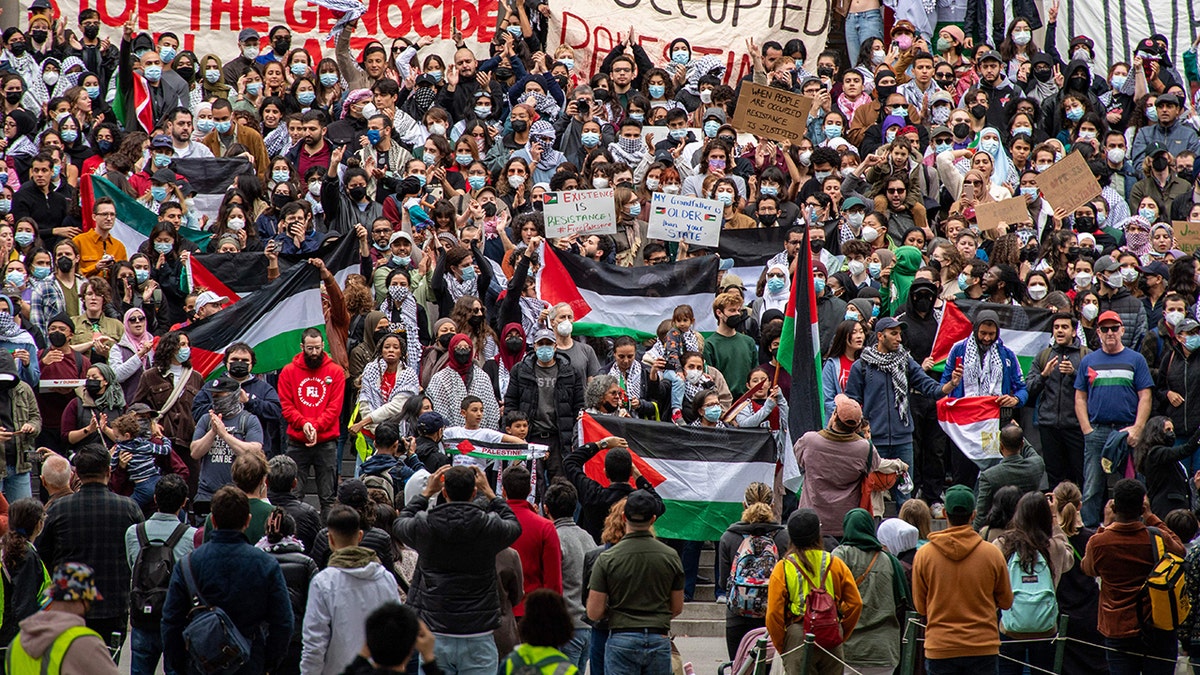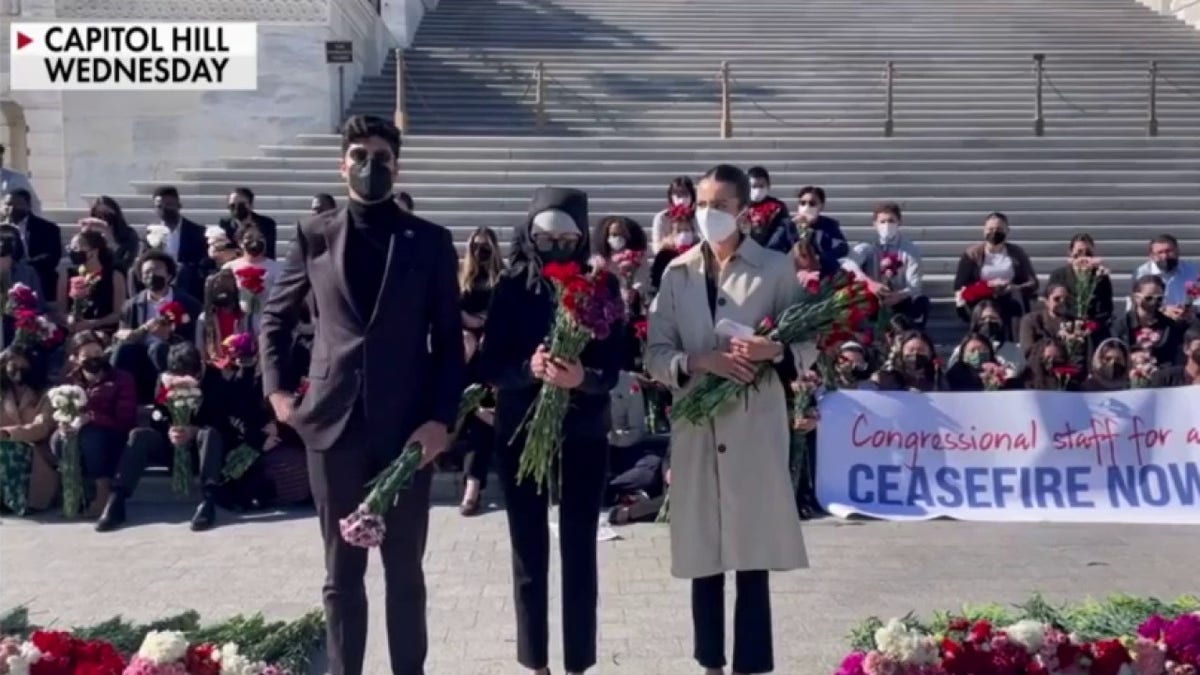Pro-Palestinian protesters disrupt traffic in DC
Pro-Palestinian protesters marched through Washington, D.C., on Thursday morning, disrupting traffic in the city.
Academic pedigree is no longer a reliable indicator of intelligence.
Millennials today are the most educated generation in American history, with around 40% holding a bachelor’s degree or higher. Yet they are also among the most ignorant and misinformed. And the Israel-Hamas war, and the global antisemitism surge that followed, has been a disturbing case in point.
One reason behind this phenomenon is the generational disparity when it comes to news consumption. While older generations still rely heavily on traditional news sources for current events, 32% of 18-29-year-olds are getting their news from alternative news sources on platforms like TikTok, oftentimes from influencers or self-proclaimed citizen journalists on the ground, who are not bound by fact-checking or ethical reporting standards observed in newsrooms.
FETTERMAN BLASTS PRO-PALESTINIAN PROTESTERS: 'WHY AREN'T YOU DEMANDING THAT HAMAS SURRENDERS?'
It’s no coincidence that today one in five young Americans believe the Holocaust is a myth, with an additional 30% of respondents polled aged 18-29 unsure if the Holocaust took place.

Supporters of Palestine gather at Harvard University to show their support for Palestinians in Gaza at a rally in Cambridge, Massachusetts, on October 14, 2023, just seven days after the horrible Hamas attack on Israel. (Photo by JOSEPH PREZIOSO/AFP via Getty Images)
I had never used TikTok before, in large part because of its reputation for perfecting a hypnotic algorithm that continuously feeds users content they want to imbibe, sapping hours of their lives before they realize how much time they’ve spent on the platform.
But this week I downloaded the app for the first time to see how long it would take – and with as few prompts as possible – before the app would start sending me down an antisemitic rabbit hole.
The same toxic rabbit hole that compelled Jewish social media influencers to issue a scathing open letter about how TikTok "lacks critical safety features to protect Jewish content creators and the broader Jewish community, leaving us in digital and physical danger."
The same toxic rabbit hole that forced Barak Herscowitz, TikTok’s top government relations official in Israel, to step down from his role late last month. And the very same Jew-hating abyss that forced TikTok executives to fly to Israel this week to meet with the country’s president amid mounting concerns that the platform – and its 40,000 moderators – are unable to control the virulent spread of antisemitic content online.
My initial findings on TikTok were staggering. After scrolling briefly through make-up tutorials, synchronized dances and adorable dog videos, I stumbled across a video of a pro-Palestinian roaming kosher supermarkets in the U.S. and stopping visibly Jewish employees and customers to force them to say "Free Palestine."
After stopping on that video, the platform’s algorithm started feeding similar videos and the floodgates opened. Videos that appeared to be moderate or even pro-Israel were also flooded with hateful and antisemitic comments. Alongside some videos, there were also suggested searches, based on what other users had been browsing, including "Jews worship the devil" and "Government is controlled by Jews."
There is and should always be a clear demarcation between free speech and hate or violent speech. The same applies on social media platforms. TikTok officials told officials in Israel that it had already expunged 160 million fake TikTok accounts spreading disinformation online since the Israel-Hamas war broke out last October. But more needs to be done, including providing more robust antisemitism training to moderators who can help stem the spread of hateful content online.
That’s because digital hate doesn’t stay online. It has real-life consequences, and is why so many young people march in the streets spouting hateful slogans that overtly or covertly call for the destruction of the Jewish people.

Over 100 Congressional staffers walk out for a ceasefire in Gaza, which would leave terrorist Hamas still in power and holding more than 100 hostages. (FOX News)
The concerning development here is that when pushed just a little bit on their motivations for spreading hateful content, whether intentional or not, many young people don’t know what they’re chanting about – or much about the Middle East.
An insoluble conflict that has caused so much devastation and deadlock for decades cannot be distilled fully into a 15-second TikTok – and it shouldn't have to be. If younger generations want to engage in these very complex and tough topics, they need to be willing to take the time to read up on the subject, entertain multiple perspectives and not stay confined in their snug echo chambers perpetuated by TikTok's hypnotic algorithm.
An illuminating study written about in the Wall Street Journal late last year found that the vast majority of college-age students who were taking part in anti-Israel protests didn't even know which river and which sea they were referring to when chanting, "From the river to the sea, Palestine will be free."
CLICK HERE FOR MORE FOX NEWS OPINION
Dov Forman runs a massively popular TikTok account with his 100-year-old great-grandmother, Lily Elbert, who survived the Holocaust. Forman uses the account to share lessons from the Holocaust while issuing warnings of rising antisemitism to their 2.1 million followers.
My initial findings on TikTok were staggering. After scrolling briefly through make-up tutorials, synchronized dances and adorable dog videos, I stumbled across a video of a pro-Palestinian roaming kosher supermarkets in the U.S. and stopping visibly Jewish employees and customers to force them to say "Free Palestine."
But the account has been subjected to vile antisemitic abuse, receiving around 1,000 antisemitic messages every day since the Hamas terror attacks of October 7.
"The intensity and frequency of antisemitic content, ranging from Holocaust denial and distortion to overt expressions of racism and extremist sympathies, have alarmingly increased in recent months," Forman told me. "These digital arenas have become breeding grounds for radicalization, often influenced by external bodies, including investment from Iran and China, aiming to exploit the impressionable minds of young children."
CLICK HERE TO GET THE FOX NEWS APP
Platforms like TikTok, Forman added, should prioritize user safety over profit, and in order to keep Jewish creators safe, more can be done to implement stringent platform policies, robust educational initiatives, and a collective societal commitment to uphold the dignity and respect of all individuals.
Suffice it to say that after writing this piece, I deleted TikTok from my phone.










































